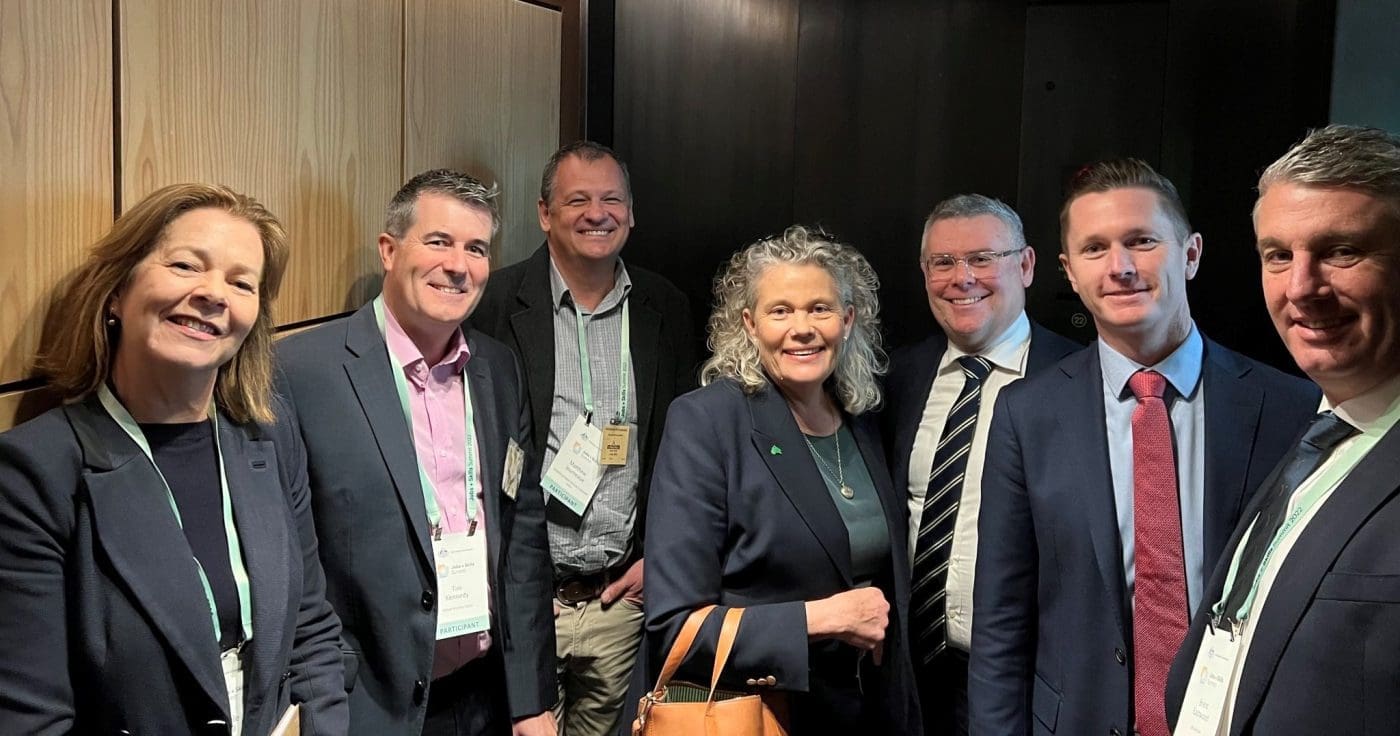
A tripartite agriculture working group of unions, industry and government has been set up to help address labour shortages. Photo: Murray Watt Twitter
FARMERS, meat processors and wool producers have welcomed a Federal Government commitment to lift the permanent skilled migration rate by 35,000 places this year.
The commitment was followed by Minister for Agriculture Murray Watt, unions and the National Farmers Federation announcing the formation of a tripartite working group with the aim of making sure agriculture has access to the right workers.
Minister for Home Affairs Clare O’Neil told the Jobs and Skills Summit in Canberra today that over the last few weeks, the size of the migration program had been a huge focus.
“We have run more than 100 roundtables, and spoken to so many stakeholders in this room,” Ms O’Neill said.
“There is nothing in this room without universal support, but an area where almost everyone agrees, is that we need to lift the permanent migration numbers for this year.
“I want emphasise that one of Labor’s priorities is to move away from the focus on short-term migrants, toward permanency, citizenship and nation building.”
Ms O’Neill said the plan will result in plenty of workers for regional Australia.
“The permanent skilled migration rate for 2022/23 had been set at 160,000 places. The government will increase that number for 2022/23 to 195,000.” she said.
“I note David Littleproud is here – David, this will mean 34,000 places in the regions for this year, 9,000 more than had previously been announced. To our state and territory premiers – we are building in a big lift under the state and territory sponsored visas – from 11,000 last year to 31,000.”
Dedicated ag group set up
A tripartite working group between the government, unions and industry has been set up with aim of making sure agriculture has access to the increased migration numbers. Agriculture minister Murray Watt said the idea was work cooperatively on the issue.
“What we’re going to be doing is working together to solve some of those challenges that have been bedevilling the agriculture industry for a number of years,” Mr Watt said.
“To make sure that farmers can get the workers that they need, and to make sure that agriculture workers are protected and respected in their work.”
Mr Watt said the aim was to work through the major announcements from the jobs summit, so agriculture can benefit.
“We have made announcements about extra fee free TAFE places and other skills programs, we have made announcements about lifting the migration cap, as well as speeding up visa processing,” he said.
“All of these things are massive issues in agriculture.”
Nationals campaigning for ag visa
Nationals leader David littleproud attended the conference, campaigning to bring back the ag visa the previous government was trying to implement.
Mr Littleproud said he wanted to work collaboratively in addressing the labour shortage.
“As the NFF said earlier today, to get food from a farmers paddock to your plate we are about 172,000 workers short,” he said.
“I welcome the government’s continued support of the pacific schemes; they are important but they can’t do it all.”
JBS calling for reduction in red tape
Another attendee at the summit was JBS Australia CEO Brent Eastwood, who said the government needed to reduce red tape.
“The immediate need for workers is real and if not addressed as a priority by the Federal Government could impact food security and the viability of businesses along the supply chain,” Mr Eastwood said.
“Even with unemployment at record lows, we continue to recruit locally where we can and work collaboratively with local stakeholders and unions around responses to the jobs crisis across Australia.
“We are calling for an immediate response that will address red-tape and bottlenecks in the processing of visas and removal of the postcode exemption for metropolitan businesses employing workers under the Pacific Island Scheme.”
Ag groups welcomed announcement
Australian Meat Industry Council chief executive officer Patrick Hutchinson said any lifting of the skilled migration cap is well-received.
“The key is to ensure we can process all outstanding Visas in the system at the moment so we can actually take advantage of the cap raise, rather than just add to the longer line of visa applications
“AMIC continues to work behind the scenes with a range of ministers, their offices and departments on the ability of our industry to gain access to a permanent workforce containing both domestic and international workers,” he said.
“This is a must as livestock population, according to forecasts, rises.
“If we fail to increase our capacity then farmers who are increasing herds and flocks would see an impact on price if capacity cannot manage livestock numbers into the future.”
WoolProducers Australia CEO Jo Hall said the body welcomed the tripartite initiative.
She said farmers, government and the unions working together would be an important stepping stone and she thanked Mr Watt for facilitating the initiative.
“At the end of the day, we all want an adequate skilled workforce.
Employers need to provide appropriate amenities and facilities to make ag an attractive proposition to workers,” she said.
“We look forward to collaborating to achieve some outcomes, fully cognisant that we won’t agree on all things, but if there is a forum to hold these discussions that’s a positive step.”
- Beef Central will discuss the summit with JBS’s Brent Eastwood on Monday
